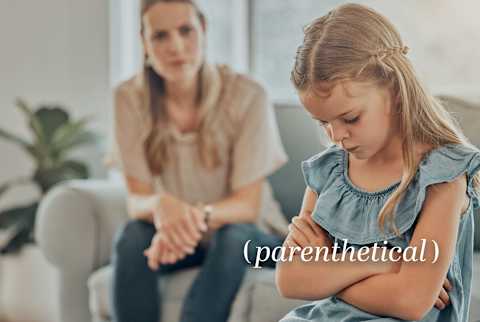Stop Your Parenting Shame Spiral—Helpful Advice From A Mom & Therapist
Parenting is hard, but shame is not required.

January 09, 2025 We carefully vet all products and services featured on mindbodygreen using our Our selections are never influenced by the commissions earned from our links. In mindbodygreen's parenting column, Parenthetical, mbg parenting contributor, psychotherapist, and writer Lia Avellino explores the dynamic, enriching, yet often complicated journey into parenthood. In today's installment, Avellino talks about addressing internal shame as a parent. As a psychotherapist for several years, I am privy to hearing the private stories that people feel shameful about. Parents, in particular, share about not being productive enough, patient enough, in shape enough, or good enough at their jobs. Parenting has become another measure to which we stack up our “enoughness.” And the less worthy we feel, the more we want to hide the unworthiness, and the less likely we are to address the root causes of our shame, impeding healing for ourselves and our families. Shame researcher Brené Brown defines it as “the intensely painful feeling or experience of believing that we are flawed and therefore unworthy of love and belonging–something we’ve done or failed to do makes us unworthy of connection.” This is typically why we keep the thing we are ashamed about a secret—we believe it will compromise our relationships and peoples’ acceptance of us. While it is one thing to notice the things we don’t like and want to change in our lives, it is completely different to shame ourselves into believing we should be better. The tricky thing about shame is the more that we allow the narrative that we are “bad” to thrive, the less likely we are to change the behavior that we do not like. Shame has the lowest energetic value out of any emotion, meaning that it renders us inert and we are least likely to take action when we are in it. Shame, instead, induces a desire to hide (wanting to close our eyes, go under the covers, and run away from life) or self-criticize–we believe that if we whip ourselves hard enough, we will eventually be able to run faster toward our goals. Shame has positive value as well, as, at times, it lets us know that we are out of sync with our values or our community (we want to behave in ways that don’t lead to social devaluing and feeling shame can help us course correct, sometimes overly so at the cost of our authentic selves). But we must pause to better understand the message shame has for us–if we feel it constantly, it could be evidence that we are only taking action against ourselves instead of actually changing the things we do not like. Here is a 5-step invitation to get to know your shame and address it in a way that allows you to make changes, without harming yourself or teaching your children to self-shame in the process. 
Identify when you are starting to shame spiral
Shame may be so familiar to you, that you don’t even know you’re experiencing it. Our culture uses shame as a tool to motivate behavior; we are taught to feel shame about our bodies so we purchase diet programs, we are told to feel shame about aging, so that we buy expensive lotions, we are taught that we are “bad,” so that we can seek outside reassurance that will make us feel “good” again.
Maybe your caregivers used shame as a way to deter you from doing “bad” things, threatening to take something you loved away if you didn’t follow the rules, or telling you your body or personality weren’t right, as a way to soothe their own anxiety about your differences and maintain control over you. Shame may be something you live with, but perhaps it doesn’t belong to you, and was actually passed down to you.
The more knowledge about your shame you have, the more you’ll be able to change your relationship to it. Get to know when your shame arises. Is it in the form of self-criticism? Do you notice you’re critical of your child as well? Does the tone of your shame sound like anyone you know? Do you often feel regret about things you said or ate? What are the sensations in your body that arise when you are in your shame space?
Shame often has a heavy feeling, like you want to shut down or withdraw. Get to know it through the process of neutral observation.
Get critical of the standard you’re trying to achieve
Our relationship to shame is often one we observe in those around us or inherit from belief systems that came before us. We get angry at ourselves for not being able to reach societal standards–like ”bounce back” after childbirth or master perfectly attuned parenting. Anger turned inward slows us down and perpetuates harm; anger turned outward (at the right sources) can create social change.
When you notice you feel shame, ask yourself what is coming up at that moment. For example, is the problem that you are not a “patient” enough mom, or is it that you are doing too much on your own because of a lack of access to childcare (or inheritance of the American belief that being able to do it by yourself is ideal)?
When you are not feeling “thin enough,” is your body the problem, or is it the fact that Instagram has served you 100 pictures of manipulated images that make you feel less than? What would it be like to be pissed off about the ways the world around you is failing you, rather than looking at yourself as the failure? How would this shift the way you feel about yourself?
Take a moment to come back to yourself
Oftentimes, when we are in a shame spiral, we talk to ourselves in ways we wouldn’t dare speak to anyone else. Instead, imagine yourself as your friend, what would you say to her in the moments she messes up? What would you ask her? How would you comfort her?
It can be hard to do this, when the voice of your self-critic has been trained to be so loud and persistent. But once you begin to recognize when you’re entering a shame spiral, the sooner you can put the shame on the shelf and replace it with caring questioning, the more you can learn about what the shame is covering up in the first place–often a lot of pain, fear, grief, and self-knowing, not evidence that you are bad and unworthy.
Tell the truth about your shame
The behavior you don’t like is often not the problem, it’s the shame you feel about it that has negative consequences for you and your children. Perfectionism can be the cover up of shame. When we are striving to get it right all the time, we are often trying to protect ourselves from getting in touch with our shame, which is why when we feel it, we typically want to hide it, deny it, ignore it. And yet, the antidote to shame is to be exposed and cared for. If you’re feeling like a bad mom, telling someone you feel seen, soothed and secured by, can help the feeling lessen. If you feel like your body is displeasing, talk about it. Allowing the shame to be acknowledged and welcomed, is what heals it—not becoming the perfect mom with the perfect body.
Repair, repair, repair
Many of us aren’t taught that one of the biggest problems in our relationship with ourselves and with others, isn’t that we make mistakes, it’s that we don’t spend enough energy making it right through repair. If you scream at your child, if you blame yourself, if you spend money secretly and keep it away from your partner, if you lie, your behavior is letting you know that you aren’t living in good standing with yourself because you are hurting or you need support. However, you don’t need to blame or fix yourself, but instead first must repair with yourself.
Repairing acknowledges:
Once you are able to make amends with yourself, it will help you feel less like you’re a bad person, and more like you are doing right by yourself in examining the behavior and making plans to change it. This frees you up to apologize to others, like your children or your partner, because you are coming from a safer and more accepting place within yourself.
The takeaway
The best relationships aren’t the ones with the least challenges, they are the ones where each person owns their role in the conflict, faces their struggles, and tells the truth with integrity and respect.
Replacing shame with curiosity gives you the space to make actual change instead of traveling down a spiral that leads to feeling unworthy, undeserving of care, and disconnected from those you love.
Learning about our shame sends ourselves and our children the message that we believe we have the power to grow and change all the time.

 KickT
KickT 

































